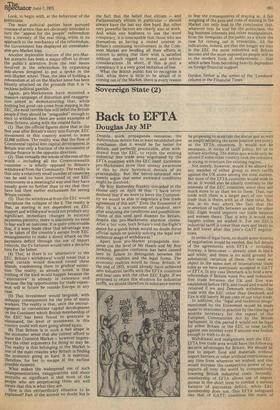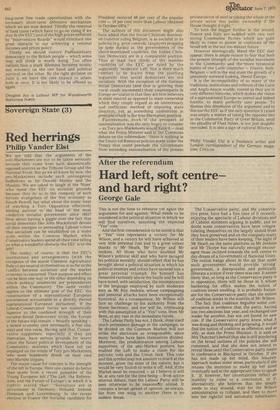Sovereign State (2)
Back to EFTA
Douglas Jay MP
Despite much propaganda nonsense, the Referendum debate has at least established one conclusion: that it would be far better for Britain, and perfectly practicable, after withdrawal from the EEC, to rejoin the existing industrial free trade area negotiated by the EFTA countries with the EEC itself. Extremist pro-Marketeers show their uneasy awareness of this by their hysterical denials of its practicability. But the better-informed now merely argue that some awkward conditions might be involved.
Mr Roy Hattersley frankly conceded in the House only on April 30 that "I have never doubted that if we were to leave the Community we would be able to negotiate a free trade agreement of this sort." Even the Economist of May 10, in a rare moment of candour, says after analysing the conditions and possibilities: "None of this need spell disaster for Britain, despite the pro-Marketeers alarmist claims. After a 'No' vote, both Britain's and the Eight's desire for a quick break would no doubt focus official minds on quickly solving the legal and technical snags of withdrawal."
Apart from pro-Market propaganda nonsense (on the level of Mr Heath and Mr Roy Jenkins), genuine confusion has been caused here by failure to distinguish between the economic realities and the legal forms. The economic realities would be these. Britain, at the end of 1975, would already have achieved zero industrial tariffs with the EFTA countries and near-zero with the other EEC Eight. If we proposed to retain this situation for industrial tariffs, we should therefore in substance merely be proposing to maintain the status quo as well as simply adopting the same position and policy as the EFTA countries. It would not be necessary, in terms of tariff policy, for us to initiate anything. The status quo would only be altered if some other country took the initiative in trying to overturn the existing regime.
Not merely, however, would it be absurd for any member of either group to erect tariffs against the UK alone among the total sixteen. But none of the EFTA countries would wish to do so. It would also be clearly contrary to the interests of the EEC countries, since they sell much more to us than we to them. True, our trade with them is a larger part of our total trade than is theirs with us of their total. But this in no way alters the fact that the re-erection of tariffs between us and the other EEC Eight would improve our trade balance and worsen theirs. That is why it would not happen unless we wished it. For the EEC's industrial tariff is lower than ours and likely to be still lower after this year's GATT negotiations.
In terms of legal form, no doubt some months of negotiation would be needed. But full details of the agreements with EFTA — including Norway, a latecomer — already exist in black and white; and there is no solid ground for substantial variation of them. Nor need we object to the same sort of international trade rules as we have previously accepted in GATT or EFTA. In any case Denmark is to hold a new referendum if Britain votes No; and industrial free trade between the UK and Eire was established before 1972, and could and would be retained if we and Denmark withdrew. Our trade with the EEC other than Denmark and Eire is still barely 30 per cent of our total trade.
In addition, the "legal and technical snags" mentioned by the Economist would be made easier to overcome in practice by the time lag of months necessary for the repeal of the European Communities Act by the British Parliament. In this period it would not be legal for either Britain or the EEC to raise tariffs against one another even if anyone was foolish -enough to wish to do so.
Withdrawal and realignment with the EECEFTA free trade area would have the following decisive advantages for Britain. We should be free to import food and materials without import barriers or other artificial restrictions at any time from wherever we wished; and this would increase the.competitive power of our exports all over the world by comparatively lowering British industrial costs. Secondly, membership of EFTA allows use of import quotas in the short term to combat a serious balance of payments deficit, while EEC membership does not. This EFTA safeguard like that of GATT, combines the merit of long-terrrr free trade opportunities with the necessary short-term defensive mechanism which we are now denied. Thirdly the removal of food taxes (which have to go on rising if we .stay in the EEC) and of the high prices enforced by "Intervention Boards" would,eliminate one great obstacle to our achieving a rational incomes and prices policy.
Finally we should restore Parliamentary democracy to the British people — which some may still think is worth doing. Too often nations face a stark dilemma between economic solvency on the one hand and political survival on the other. By the right decision on June 5, we have the rare chance to attain both at once. It is not likely to be offered us again.
Douglas Jay is Labour MP for Wandsworth Battersea North



































 Previous page
Previous page